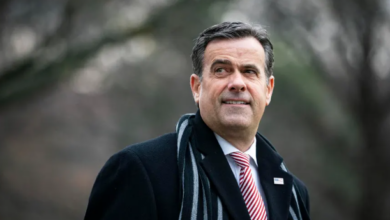Ukrainian Cultural Festival In Washington Roils With Hope, Fear And Anger

SILVER SPRING, Md. — For some, it’s hearing air raid sirens while talking with relatives back in Ukraine. For others, it’s the fear that Ukraine may become an economic basket case, even if it wins the war. Or that the world may forget the country’s plight altogether.
Ukrainans, their friends and those simply curious about the country that’s fought Russia to standstill gathered on a sun-splashed weekend at St. Andrew Ukrainian Orthodox Cathedral in suburban Washington for the region’s biggest annual Ukrainian cultural festival.
Amid women wearing garlands in their hair, men wearing vyshyvanka — white shirts with intricately patterned embroidery down the front — and accompanied by traditional and pop Ukrainian music, the war was never far from people’s minds. What in past years had been a chance to showcase the culture and drink some beers from the home country had taken on a different, somewhat deeper meaning.
“This year is particularly beautiful and sad at the same time,” said the church pastor, the Rev. Volodymr Steliac, as he formally opened the festival Saturday.
“We have seen the worst of humanity but at the same time we have seen the best of humanity.”
The festival opened on Day 206 of the invasion and came amid good news for Ukraine: a surprise counteroffensive in the northeast that in a few days cleared Russians from towns and villages they had fought weeks to take earlier in the war.
But the victory came with a price. In the strategic town of Izium, mass graves were found, similar to those seen in the capital Kyiv’s suburb of Bucha when the war began.
“We have seen the worst of humanity but at the same time we have seen the best of humanity.”
– The Rev. Volodymr Steliac, St. Andrew Ukrainian Orthodox Cathedral
Oksana Sukhina, who was staffing the booth of the U.S. Ukraine Foundation, where she is project director, said she wanted to see what the impact of the latest reports of atrocities will be on Europe.
In the past, she said, some people suspected Ukrainians have exaggerated the cruelty of the Russians with reports of horrific claims like rape as a weapon of war and the theft of household goods then shipped to Russia.
“Then you see Bucha, you see now Izyum. And we have yet to see Kherson and Mariupol and other places,” Sukhina said.
Sukhina, 50, immigrated to the U.S. from Kyiv in 2020. Warned by former colleagues in the State Department about the likelihood of invasion, her parents arrived in Washington only days before the war.
But as the prospect of Kyiv’s being captured receded, they went back, as did one of her daughters. They joined a 23-year-old son who left his IT job in Chicago in March to help deliver food and medical supplies in Kyiv.
Sukhina said she tried to convince him to stay, but could not forbid him to leave because she had participated in pro-democracy protests in 2004 and 2014.
“I’m proud of them. They are trying to do whatever they can. And this is what makes us win,” she said.

Steliac said the church was open 24-7 when the war began. He was only getting two or three hours of sleep a night as volunteers dropped off humanitarian aid, organized it and shipped it to Ukraine.
In one 48-hour period, he said, two of those young volunteers lost their fathers back in Ukraine.
“The war is not there alone; the war is here as well,” Steliac said.
Even though the process of gathering and sending aid has become more routine, even keeping in touch with family back home, he said, can be painful.
“What was traumatic was that they were communicating with their relatives and they said, ‘Oh, a bomb fell just a couple of neighborhoods over’ and then they tried to connect again and the phone connection doesn’t go through,” Steliac said.
“You think of the worst.”
Alex Naumovych, a 36-year old mortgage loan officer from Ternopil in the western part of Ukraine, said he’s had calls interrupted by the air raid sirens, although now he said the alarms are likely to be ignored.
Ternopil, a city of about 250,000, has no military targets, but he said his parents still hear the sirens daily. Ukraine tracks incoming missiles and activates local warning systems based on where they could potentially land, so even residents of cities not targeted are warned.
“I’m worried that, sooner or later, one of those missiles may hit my city, like my parents’ place,” Naumovych said.
Naumovych arrived in the U.S. almost 11 years ago. He had about $440 to his name then, he said, and started a landscaping business he sold years later for more than $1 million.
“I’m worried that, sooner or later, one of those missiles may hit my city, like my parents’ place.”
– Alex Naumovych, mortage loan officer originally from Ternopil region of Ukraine
“I love this country. Like you can come with $400 and six, seven years later you can be a millionaire,” he said.
One of his big worries for Ukraine now is its economy, with so many people out of work because of the war and inflation projected to hit 30%.
“The economy is in bad shape,” Naumovych said. “A lot of people left Ukraine and I’m not sure they’re coming back”
The parents of software engineer Serhiy Vorobiov, 43, are near the war’s front line in Zaporizhzhya, a Russian-speaking region that includes Europe’s largest nuclear power plant. Russia has captured the plant and Ukrainians and others fear they will use it for blackmail.
But Vorobiov said his parents, only 25 miles from the front lines in the city of Zaporizhzhya, still think everything is relatively safe. He said he chats with them with about the same frequency as before the war.
“Maybe because there is no very high emergency at this point. I know it’s not to my defense, but that’s how it is,” he said.
Vorobiov, his wife Oksana, 33, and their three young children, Yaromyr, Myroslava and Oksana, have lived in the U.S. since 2020. He said the war has reinforced his belief in getting rid of any Russian influence on their upbringing.
“I always dreamed of it, I just didn’t want to be very tough in that. But now I have all the rights and I want to use it,” Vorobiov said.
“I want them to forget [the] Russian language. We are from [the] Russian-speaking part of Ukraine, but now we are fixing it, as much as we can. Forget Russian, forget we were ever together, [forget] Soviet Union. I’m happy they don’t know what Soviet Union is.”

SOPA Images via Getty Images
But in her remarks to open the festivities, Oksana Markarova, the Ukrainian ambassador to the United States, advised focusing on the present, not the past.
“Please be joyful today,” she counseled.
She said Russian leader Vladimir Putin and the Russians want Ukrainians to “sit down and cry” at the devastation.
“This is what Russians want us to do. And we will not give it to them.”

JUAN BARRETO via Getty Images
[ad_2]
Source link





